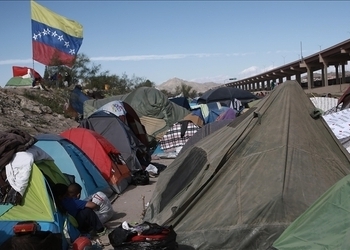International experts are predicting continued high levels of migration from Venezuela, which could prove a boon for organized crime groups that have already capitalized on the ongoing exodus.
Venezuela remains mired in a humanitarian and economic crisis a decade in the making, according to an independent fact-finding report presented to the United Nations Human Rights Council on September 25.
The fact-finding mission’s chair, Marta Valiñas, said human rights violations and repressive tactics by the Venezuelan government have “given rise to a prevailing culture of fear, mistrust, and self-censorship.”
Combined with hyperinflation and shortages of fuel, food, water, and medicine, these conditions have pushed nearly 8 million Venezuelans to flee their country since 2014, according to R4V, the UN platform monitoring the crisis. R4V released its latest figures last week, which also showed that a consistently high number are continuing to move towards the United States.
The majority of Venezuelan migrants remain in South American countries. But increasing numbers have made their way to the United States in the wake of the COVID-19 pandemic, which left many Latin American countries’ economies battered and unable or unwilling to support Venezuelan migrants.
SEE ALSO: How Risks Facing Migrants in Latin America Have Multiplied
The conditions within Venezuela have also moved President Joe Biden’s administration to announce a policy package that expands temporary protective status (TPS) for Venezuelan nationals in the United States.
TPS protects those who arrived in the United States before a designated date from deportation, giving adults relatively fast access to employment authorization and allowing their children to attend school, regardless of whether they entered the country through a legal port of entry.
The protected status was first given to Venezuelans in 2021. The re-designation announced on September 20 protects Venezuelans who were already in the United States before July 31, but it has no direct effect on Venezuelans who are en route to or waiting at the US-Mexico border.
InSight Crime Analysis
The ongoing crisis in Venezuela, neighboring countries’ inability to cope with the continuously growing number of migrants, and confusion around US immigration policy are providing fertile ground for organized crime to continue to thrive along the Venezuela-US route.
Decades of US migration policies emphasizing deterrence have created a lucrative black market for human smuggling along the route and especially into the US. These policies have also created a bottleneck at the US-Mexico border, where criminal groups profit from the kidnapping, extortion, and human trafficking of migrants who are stuck or sent back.
The number of migrants arriving at this border has skyrocketed over the last several years, with encounters more than quadrupling between 2020 and 2023. Venezuelan arrivals went from negligible to being the second largest group to cross the US-Mexico border after Mexicans themselves. In response, human smuggling operations, as well as criminal groups that exploit migrants, have become even more sophisticated and powerful, and the participation of corrupt officials in these activities has also grown.
SEE ALSO: The Gauntlet: One Migrant’s Journey from Venezuela to the US-Mexico Border
Biden’s TPS expansion, while largely positive, could benefit smuggling networks and ultimately increase opportunities for organized crime groups to exploit migrants by adding to existing confusion around the US’s migration policy. Migrants learn about the developments in the US system primarily through other migrants, and details are often lost in communication or slow to arrive, according to experts.
“We know that smugglers sometimes will tell people, ‘If you hurry and get to the US, you can take advantage of this [policy]’ or other things that aren’t true,” Migration Policy Institute expert Julia Gelatt told InSight Crime.
The Venezuelans who act on this misinformation won’t be eligible for TPS, but they may be affected by the migration policy package’s deterrent measures, such as expedited family removals and deportations to Mexico. From there, they face a choice between contracting smugglers to take them over the border once more, staying put to risk kidnapping or extortion, or beginning the arduous journey home.

